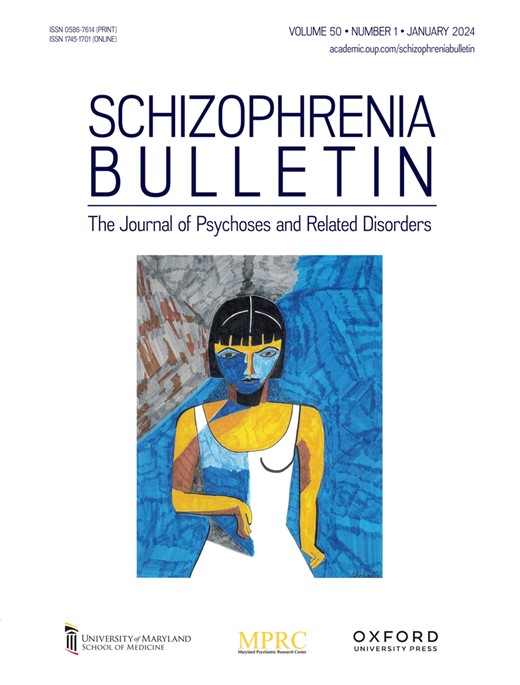Ecological Momentary Assessment of Emotion Regulation and Suicidal Ideation in First-Episode Psychosis
IF 4.8
1区 医学
Q1 PSYCHIATRY
引用次数: 0
Abstract
Individuals with first-episode psychosis (FEP) are at increased risk for suicide, though few studies have examined the extent to which emotion regulation abnormalities contribute to this risk. The current study sought to address this gap by examining which stages of emotion regulation (ie, identification, selection, implementation) are related to suicidal ideation among individuals with FEP. Forty-one participants completed 28 days of ecological momentary assessment to assess suicidal ideation, negative affect, and emotion regulation in real-time. Results indicated that all 3 stages of emotion regulation were related to suicidal ideation in FEP. Specifically, within-person emotion regulation interacted with between-person negative affect to predict concurrent suicidal ideation (identification stage). Additionally, decreased use of adaptive strategies and increased use of maladaptive strategies were associated with more severe suicidal ideation (selection stage). Finally, decreased emotion regulation effectiveness was associated with more severe suicidal ideation (implementation stage). These findings suggest that emotion regulation difficulties might contribute to the high rates of suicide risk among individuals with FEP. Additional research is needed to determine whether these emotion regulation difficulties are unique to FEP or if they also appear in other high-risk groups.首发精神病患者情绪调节与自杀意念的生态瞬时评估
患有首发精神病(FEP)的个体自杀风险增加,尽管很少有研究调查情绪调节异常在多大程度上导致了这种风险。目前的研究试图通过检查情绪调节的哪些阶段(即识别、选择、实施)与FEP患者的自杀意念有关来解决这一差距。41名参与者完成了28天的生态瞬时评估,以实时评估自杀意念、负面影响和情绪调节。结果表明,FEP患者情绪调节的3个阶段均与自杀意念有关。具体而言,人内情绪调节与人间负面情绪相互作用,预测并发自杀意念(识别阶段)。此外,适应策略的使用减少和适应不良策略的使用增加与更严重的自杀意念(选择阶段)有关。最后,情绪调节效果的降低与自杀意念(实施阶段)的加重有关。这些发现表明情绪调节困难可能是FEP患者自杀风险高的原因之一。需要进一步的研究来确定这些情绪调节困难是否是FEP独有的,或者是否也出现在其他高风险人群中。
本文章由计算机程序翻译,如有差异,请以英文原文为准。
求助全文
约1分钟内获得全文
求助全文
来源期刊

Schizophrenia Bulletin
医学-精神病学
CiteScore
11.40
自引率
6.10%
发文量
163
审稿时长
4-8 weeks
期刊介绍:
Schizophrenia Bulletin seeks to review recent developments and empirically based hypotheses regarding the etiology and treatment of schizophrenia. We view the field as broad and deep, and will publish new knowledge ranging from the molecular basis to social and cultural factors. We will give new emphasis to translational reports which simultaneously highlight basic neurobiological mechanisms and clinical manifestations. Some of the Bulletin content is invited as special features or manuscripts organized as a theme by special guest editors. Most pages of the Bulletin are devoted to unsolicited manuscripts of high quality that report original data or where we can provide a special venue for a major study or workshop report. Supplement issues are sometimes provided for manuscripts reporting from a recent conference.
 求助内容:
求助内容: 应助结果提醒方式:
应助结果提醒方式:


